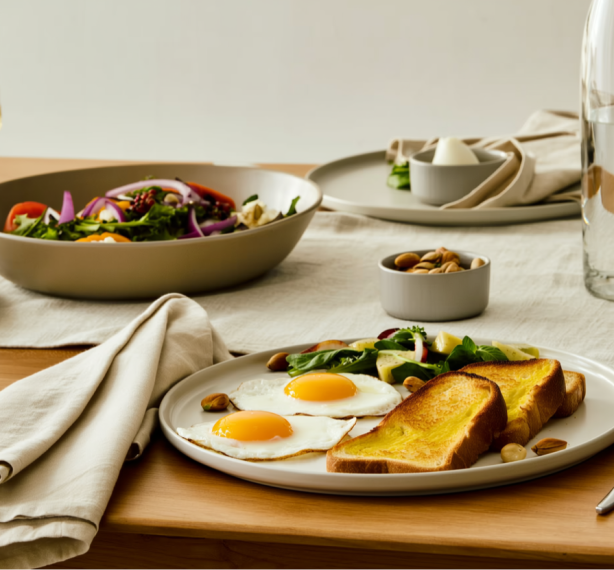
Spring is one of the most beautiful seasons of the year, but it is also one of the toughest for the body. After the winter period with minimal sunlight, warmth, and vitamins, we all struggle as our bodies begin to falter, making it difficult to wake up energized in the mornings and stay alert throughout the day.
This condition is often referred to as “hypovitaminosis,” when the body’s needs for vitamins and nutrients are not fully met. This is due to changes in our dietary habits during the winter period (we crave more high-calorie, processed foods because our calorie expenditure increases to keep our bodies warm) and the fact that fresh vegetables and fruits become less accessible, with a limited choice available.
What does the body need for good immunity? Let’s examine this.
The body needs the right balance of vitamins, minerals, macronutrients, and micronutrients. Most vitamins cannot be synthesized by the body itself or stored for long periods, so it is very important to build a diet correctly to obtain all the necessary elements for its functioning from food.
The most basic need of the body is a daily requirement for high-quality protein for immunity maintenance and recovery. Different proteins contain different sets of amino acids, so proteins should be as varied as possible (constantly alternate products to get all the essential amino acids for the body).
The superfood of the spring can definitely be called tofu, which contains all nine essential amino acids and vitamins E and B.
Tofu provides 7 to 15 grams of protein, with firmer varieties containing more protein.
B Vitamins
B vitamins, including folic acid, are critical for brain function, good mood, regeneration, and women’s health. If you do not consume enough vitamins from this group, you may notice mood swings, fatigue, and decreased concentration. Most B vitamins cannot be stored in the body, so it is important that they are constantly supplied with food: bread from coarse flour, whole grain cereals (oatmeal, buckwheat, quinoa, and wheat), green leafy salads and spinach, all types of cabbage, legumes, soybeans, and beets.
Vitamin A
Vitamin A is essential in the spring, especially for those who fast. Vitamin A is responsible for proper tissue regeneration and maintaining a good immune system. Vitamin A is best absorbed from thermally processed foods, such as baked carrots and pumpkins. A small addition of oil will also increase the absorption of vitamin A from vegetables.
Vitamin D and Omega
Insufficient intake of these elements can lead to sleep disturbances, irritability, and mental fog. Therefore, it’s important to regularly include sources of omega-3 in your diet: walnuts, pecans, chia seeds, flax seeds, seaweed, and edamame beans. Dealing with vitamin D is slightly more complex since the plant-based source, wild mushrooms, is only available seasonally. Vitamin D plays a crucial role in immunity formation and body functioning, as well as helping in cancer prevention, and is one of the most common deficiencies in Russia. Hence, it’s crucial to monitor its level periodically by undergoing tests and, if necessary, taking supplements to maintain its optimal level.
Antioxidant Vitamins C and E
Antioxidant vitamins C and E play a crucial role in forming immunity and maintaining youthfulness and beauty. Vitamin C is better absorbed in combination with B vitamins and is abundant in fresh greens, cabbages (including sauerkraut), tomatoes, bell peppers, and citrus fruits. Natural sources of vitamin E include cold-pressed vegetable oils, legumes, whole grains, and seeds.
Iodine
Iodine is essential for maintaining proper hormonal balance and high energy levels. It is another one of the most common deficiencies in Russia, so it’s important to regularly consume iodine-rich foods to prevent iodine deficiency. Seaweed contains the highest amount of iodine; consuming just 50 grams of seaweed salad per day is enough to meet the body’s needs.
Zinc
It is necessary for forming a good immune system and fertility. Foods rich in zinc include wheat bran, pine nuts, sunflower seeds, pumpkin seeds, peanuts, chickpeas, buckwheat, and oats.
Iron and B12
If these elements are lacking in the body, you may often notice severe weakness, decreased fertility, muscle loss, dizziness, pale skin, and hair loss. These elements are critically important for women’s health. While plant-based foods only contain non-heme iron, which is less efficiently absorbed compared to iron from animal sources, vitamin B12 is completely absent from plant-based foods. Therefore, spring is the best time to check your levels of these elements to ensure your body is not deficient.
Cooking Hacks:
1. Buy vegetables and fruits in small portions for a few days at a time. Store them in a dry, closed refrigerator drawer container (e.g., kraft paper bags). Another option that will help preserve vitamins is freezing. This allows you to maximize the shelf life of vitamins.
2. Cook at one go. With each subsequent reheating, most of the vitamins are lost. Cook soups with a closed lid, and it’s important to add vegetables to boiling water (so the loss of vitamins will be minimal).
3. If you are making a salad, cut the vegetables into large pieces as much as possible to minimize the loss of vitamins and nutrients.
4. Consider the proportions when cooking. The magic for feeling good, beautiful, and youthful lies on your plate! About half should consist of vegetables; a quarter should be the main protein-rich product (tofu, chickpeas, lentils, edamame, beans); and another quarter should be a side dish (cereal, whole grain pasta, potatoes). Fruits are best consumed as dessert after a full meal since, separately, they can stimulate appetite and lead to a change in eating patterns when you choose less healthy food or snacks.



